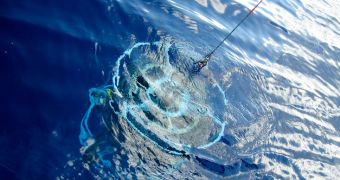According to a new scientific study, it would appear that increasing water acidification is taking its toll on the way nitrogen circulates through the waters. This discovery, which requires further investigations, may lead to the development of more accurate climate models, experts say.
The data now seem to indicate that the change is fundamental, and not only minor, as previous studies led us to believe. Details of the research were published in this week's issue of the esteemed journal Proceedings of the National Academy of Sciences (PNAS).
Needless to say, the effects of nitrogen cycle changes on the oceans and its inhabitants are very difficult to quantify. Researchers say that nearly everything that lives in the water needs the chemical.
This includes everything from small organisms such as phytoplankton to the largest mammal on the planet today, the blue whale. Some microorganisms feed on nitrogen directly.
Some microbe groups, called ammonia oxidizers, play an important role in determining which type of nitrogen will endure in the oceans, and which will be taken up, assimilated and converted into something else.
“Ocean acidification will have widespread effects on marine ecosystems, but most of those effects are still unknown,” explains the director of the National Science Foundation (NSF) Biological Oceanography Program (BOP), David Garrison.
“This report that ocean acidification decreases nitrification (the amount of nitrogen) is extremely important because of the crucial role of the nitrogen cycle in biogeochemical processes-processes that take place throughout the oceans,” he adds.
The BOP funded this investigation, alongside the NSF Chemical Oceanography Program (COP). The researchers recognized that very little was known about the role that ammonia oxidizers play in the world's waters.
They are truly “key players in the ocean's nitrogen cycle,” explains University of Hawaii expert Michael Beman, who is also the lead author of the PNAS paper.
The most important correlation that was noted in the new study was that ammonia oxidation rates tended to decrease in areas where oceanic acidification was the most pronounced.
This correlation held true regardless of where the study was conducted. Higher acidification equaled less oxidation, the team says. This holds tremendous implications for the future, as waters around the world are getting warmer and more acidic.
“What makes ocean acidification such a challenging scientific and societal issue is that we're engaged in a global, unreplicated experiment, one that's difficult to study – and has many unknown consequences,” Beman adds.

 14 DAY TRIAL //
14 DAY TRIAL //